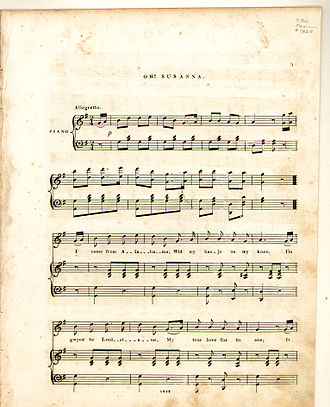"Something so old no one knows it",
 quotes "Oxford American, a Magazine of the South" in 2012. The article inspects recent recordings and the political, historical, and racial nuances of the old song. I'm more practical as a musician: I want to know "How does the song actually go so we can sing it as the author intended and the audience will like it?" Well, they're right: nobody quite knows how it goes.
quotes "Oxford American, a Magazine of the South" in 2012. The article inspects recent recordings and the political, historical, and racial nuances of the old song. I'm more practical as a musician: I want to know "How does the song actually go so we can sing it as the author intended and the audience will like it?" Well, they're right: nobody quite knows how it goes.
Steven Foster wrote the words and tune in the late 1840's, but the sheet music publications of 1848 don't agree on the details of O Susanna's exact words or rhythms. Two sheets claim "oldest publication" in 1948. New York's C. Hold Jr. publication displays "Christy Minstrels" and "G.N. Christy" prominently. Baltimore's F.D. Benteen credits "The Ethiopian Serenaders" and "Wells" for singing and writing it. Music Publisher W.C. Peters of Cincinnati had known and worked with Stephen Foster before.
Stephen Foster isn't credited on any of them, so none gets preference.
Gosh, his manuscript would be priceless, but it's nowhere to be found yet. "Beautiful Dreamer" and "Old Black Joe", we've got the mss copied online, if you care to pay to peek at them.
But this isn't 1848, it's 2019. So the question becomes, "How do people like to hear and sing it now". To answer that, you do a survey of regular folks and what they recall of the song. After interviewing a half-dozen folks, I learned this:
~ Almost everyone knows of "Oh, Susanna" and heard it in elementary school.
~ Almost everyone sings it in a lively tempo and snappy rhythmms
~ Everybody sings the words "Oh!, Susanna" on the notes fa fa la la, ...
~ Nobody has heard it sung fa fa fa la (as most early editions write it.)
~ Almost everyone fumbles the words.
~ Almost everyone remembers "banjo on my knee"
~ But are unsure if it's "a banjo" or "my banjo". (It's "my" in the sheet music.)
~ A few mention the word isn't "going", it's "gwine" and important to keep.
~ Most know about "come from", "Lou'siana", and "Alabama"...
~ but not exactly where "I come from" or "I'm gwine to".
~ Early editions start "I come", but a few singers start with "Oh, I come..."
~ Most know about a verse about "It rained" "the weather". Many can sing parts it.
~ Some know about a verse about a "dream the other night". Few can sing parts of it.
~ Few heard of a verse about New Orleans, maybe. None could sing any of it.
~ No one knows anything about a verse "riding a telegraph".
Those tell what's familiar and wanted in a sing-along:
And I bet, if the singers stop right there, the audience will still sing:
I come from Alabama with my banjo on my knee.
I'm gwine to Lou'siäna my true love for to see.
It rained all night the day I left, the weather it was dry,
The sun so hot I froze to death. Suzanna, don't you cry.
Oh, Suzanna, Oh don't you cry for me.
I come from Alabama with my banjo on my knee.
I had a dream the other night when ev'ry thing was still.
I though I saw Suzänna a-comin' down the hill.
The buckwheat cake was in her mouth, a tear was in her eye.
I said "I'm comin' from the South. Suzanna, don't you cry."
Oh, Suzanna, Oh don't you cry for me.
I come from Alabama with my banjo on my...
... knee.
No comments:
Post a Comment